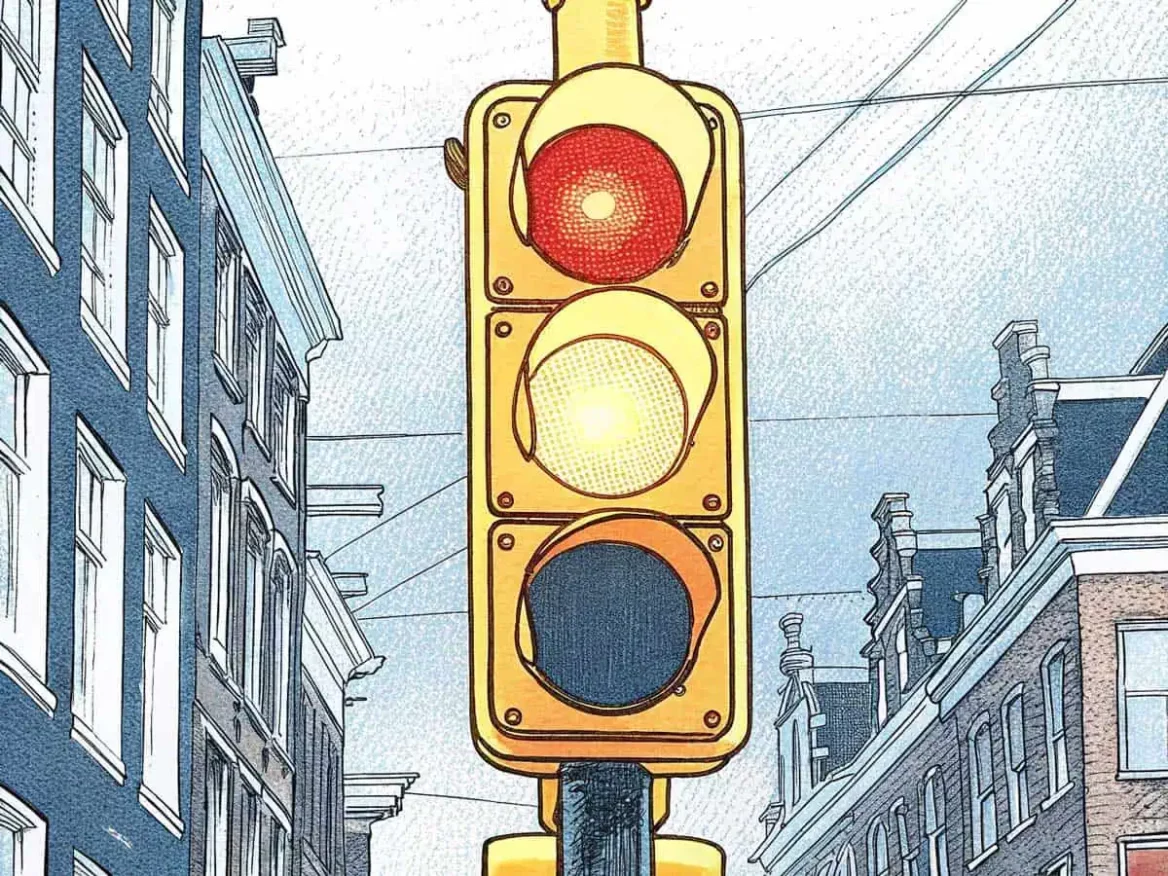In this article, I discuss the legal protection of trade names referring to specific industries, such as ‘Red Lights’ – and the limitations of that protection.
Carja Mastenbroek of Good Law discusses the legal protection of trade names referring to specific industries, such as ‘Red Lights’. A recent ruling sheds light on the limitations of such descriptive trade names and the circumstances in which infringement is found.
Introduction: the red lights of Amsterdam
The oldest part of Amsterdam is home to the world’s oldest profession. The De Wallen area is perhaps one of the most famous tourist attractions in the capital of the Netherlands. The red colour of the brothels is inextricably linked to women of loose morals. The finishing area is therefore known to tourists as (the) Red Light District for a reason. “Red Lights” very recently came up for discussion in summary proceedings relating to trade names of internet platforms for escort services. The connection between Red Lights and prostitution is quickly made, but does this also mean that a company with this name is using a descriptive trade name?
Descriptive trade names
This article first briefly discusses descriptive trade names and important Procedural law in this area. It then discusses the ruling of the Rotterdam judge in preliminary relief proceedings of 7 May last, assessing the extent to which “Red Light(s)” is a descriptive trade name for websites on which prostitutes offer their services.
The name under which a business is conducted is the trade name, which is protected by the Trade Name Act (Hnw). Thus, the user of a trade name can take action against another party conducting the same type of business under the same (or similar) name (in the same region), causing confusion between the two companies (Section 5 Hnw).
Using a domain name
In addition to using the trade name on the façade, letterhead and, for example, business cards, the use of a domain name is also, where appropriate, equated to use as a trade name.
The creation of a trade name and the ability to invoke the associated rights only requires that a trade name be lawfully used. No requirements are imposed on the name itself.
It is therefore possible that a descriptive trade name, as well as a fantasy name, is or can be a valid trade name. This is in contrast to a trademark, to which – in principle – no protection is due if it has no distinctive character cq is merely descriptive.
Distinctiveness of a trade name
However, the degree of distinctiveness of a trade name does become relevant in answering the question of whether confusion between trade names of different companies is likely, which is thus a necessary requirement for infringement of a trade name under Article 5 Hnw.
From, inter alia, the Artiestenverloning judgment (HR 11 December 2015, ECLI:NL:HR:2015:3554 (Artiestenverloningen/Prae Artiestenverloning) rendered by the Supreme Court and the Perfume Shop judgment (Court of Appeal of The Hague 19 September 2017, ECLI:NL:GHDHA:2017:2622 (ANS Trading/Parfumswinkel) by the Court of Appeal of The Hague, it follows that a descriptive trade name (and also domain name) has a more limited scope of protection.
The aforementioned statements are briefly explained below.
The Artist Remuneration Judgment
In the Artiestenverloning judgment, the user of the domain name www.artiestenverloningen.nl challenged the use of the domain name www.artiestenverloning.nl. In this judgment, the Supreme Court ruled that the use of the purely descriptive domain name was permitted, even if it was confusing.
This is permitted because, in principle, it should be possible for everyone to be able to use an indication that is descriptive of his or her goods or services. However, this may be different if additional circumstances dictate otherwise.
The ruling Perfume Shop
Although the Supreme Court did not clarify in its Artiestenverloning judgment whether this rule relating to domain names also applies to trade names, it did become clear two years later in the Parfumswinkel case in which the user of the trade name Parfumswinkel and the domain name www.parfumswinkel.nl took action against the use of the trade name Parfumswebwinkel(.nl).
During the proceedings before the Court of Appeal of The Hague, the question arose as to whether the Artiestenverloning judgment, a domain name dispute, also applies in the case of an older trade name that is merely descriptive and whether, in addition to likelihood of confusion, additional circumstances are required, as is the case with domain names sec, before there is infringement.
The court of appeal considered in Perfume Shop that if it were possible to prohibit the use of a purely descriptive trade name on the basis of Article 5 Hnw to the same type of company merely because of the, in that case, almost always occurring risk of confusion, this would in fact amount to a complete rejection of the general need to keep descriptive designations free.
Confusion plus
For this reason, according to the court of appeal, in the case of descriptive trade names, in addition to a likelihood of confusion, additional circumstances are also required.
The court gives a number of examples of (possible) additional circumstances, such as, for example, when a younger company deliberately establishes itself near the shop of an older company, using the same exclusively descriptive trade name as that of the older company.
It may also happen that a purely descriptive trade name is nevertheless sufficiently unusual, such as ‘Footwear-shop’ for a shoe shop. In that case, a younger company might as well use the usual variant Schoenenwinkel, instead of also conducting a business under the name Schoeisel-winkel itself.
Not of sufficient weight
Nevertheless, the mere fact that a purely descriptive trade name is unusual is not in itself of sufficient weight to deviate from the rule that additional circumstances are required in addition to likelihood of confusion, according to the Hague court of appeal. This will only be different if the purely descriptive trade name is highly unusual.
Finally, the court of appeal considered that a purely descriptive trade name may also have become established, as a result of which the trade name has actually acquired familiarity with the public to such an extent that, as a result, the public no longer perceives that name as purely descriptive, but as the name of a company.
What is striking about this consideration is that the court is now also applying a doctrine of Trademark Law, to which descriptive marks are attributed more distinctive character when they are established through use, to Trade Name Law.
Redlight vs. Redlight
Recently, the Amsterdam District Court’s interim relief judge also ruled on descriptive trade names (Vrz. Rb Amsterdam 7 May 2019, IEF 18445 (Link Meda/Siteways).
In the dispute between Link Media B.V. and Link Media BVBA on the one hand and Siteways Group B.V. on the other, the former has been using the domain name www.redlights.be in Belgium since 2009.
Since 2015, Link Media has also been using the domain name www.redlights.nl in the Netherlands. On the Link Media websites, which are linked to the domain names, prostitutes and service providers in the escort industry can post advertisements for their services.
Since the name Redlights is also frequently used on these websites, contrary to what is argued by Siteways in this case, Link Media is also using the Redlights trade name.
An advertising platform for paid sex
Siteways has been operating an advertising platform for paid sex under the domain name www.redlight.nl since 2019. It bought the domain name from a third party for €1,100 in early 2018. On the website under this domain name, Siteways also uses the name Redlight. According to Siteways, however, this does not mean that it uses this name Redlight as a trade name.
However, the court in preliminary relief proceedings considered that, as was the case with Link Media’s use of the name Redlights, this use of the name Redlight had (also) made it sufficiently plausible that the company in question was (also) referred to by that name and that there was therefore use of a trade name.
The fact that the name (in a descriptive sense) also refers to or refers to the (sex) services to be provided and that the website carries that domain name does not alter this.
Descriptive in nature
Siteways then invokes the rules of the Artist’s Reward and Perfume Shop judgments and argues that the name Redlight is descriptive only of the parties’ businesses, both of which are engaged in the service of placing advertisements for paid sex. Likelihood of confusion is therefore insufficient; there must be several circumstances for Link Media’s trade name rights to be infringed, Siteways said.
The preliminary relief judge did not go along with this. The Court admitted that the names Redlight and Redlights evoke associations with prostitution, but that the names are not purely descriptive of the advertising platforms. The fact that Redlight(s) is associated with the industry in which parties are active does, according to the judge in summary proceedings, ensure that the scope of protection of the trade name Redlight is limited.
A layered verdict
However, since Siteways uses a virtually identical name for a virtually identical company, its conduct, despite the minor scope of protection of the trade name, should be designated as infringement of Link Media’s trade name. Siteways may therefore not use the name Redlight as its trade name.
It is further considered that in this context, the use of the domain name www.redlight.nl is also unlawful against Link Media.
However, Link Media will – remarkably enough – have to pay €1,100 to Siteways for the transfer of this domain name, since a transfer for no consideration is not reasonable now that it has been sufficiently established that Siteways paid the amount at the time to a so-called ‘domain name grabber’ in order to obtain this (infringing) domain name, according to the preliminary relief judge.
Why the method of acquiring an (infringing) domain name should be relevant to whether or not it is transferred – for no consideration – to Link Media is not further substantiated.
Moral of the story, part 1
As follows from the rulings above, a purely descriptive trade name, including a purely descriptive domain name, has a narrower scope of protection so that additional circumstances are required to assume infringement.
This smaller scope of protection also applies to trade and/or domain names that evoke associations with the industry for which they are used. However, the question of whether, in the case of such trade and domain names referring to an industry, the scope of protection is also so limited that additional circumstances are necessary for assuming trade name infringement remains unanswered for the time being.
Moral of the story, part 2
The use of descriptive (trade and/or domain) names is often commercially / marketingly interesting because they easily stick with the public.
The flip side of this coin, however, is that there is always the danger of competitors creeping close to these descriptive trade and/or domain names without the oldest user of that name being able to take action against it.
This can then only be done if there are additional circumstances that make this use unlawful.
When there is this additional bump of “additional circumstances” to be taken into account will have to be determined on a case-by-case basis. So here too, unfortunately, the time-honoured lawyer’s thesis applies: “it depends on the circumstances of the case whether or not the litigant has a case when it concerns (the infringement of) a descriptive trade name”. Good for legal certainty? No. Something to do about it… not for now.
This article was published on 21 June 2019 in JutD 2019-0082) The version on this website contains some minor edits and new headings.


